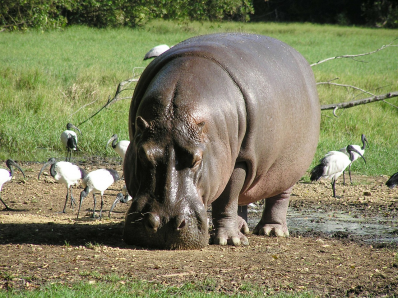Passive voice: hippopotamus
The Grammar Bit!
When writing, we have the choice of using either the active or the passive voice. The first three sentences opposite use the active voice. You’ll notice that the agent or ‘doer’ of the action, the subject (bold), appears before the receiver of the action, the object (underlined). This has the effect of putting the focus on the subject, and it gives each sentence a very strong, clear voice.
Though less frequently used in speech and writing, the second three sentences use the passive voice. You’ll notice that in each sentence, the agent of the action has moved to the end and the receiver of the action has moved to the front (becoming the new subject). Notice how the preposition ‘by’ is used in the passive voice to introduce the agent.
When writing in the passive voice, you may decide to leave out the agent of the action altogether (indicated by the brackets). This is known as the agentless passive! Discuss the effect of this with your talk partner. Why might you want to leave out the agent or ‘doer’ of the action?
Scintillating Sentences
Active voice
1) A member of the hippo sanctuary rescued vulnerable baby Molly.
2) Several aggressive bush pigs, who had razor-sharp tusks, brutally attacked the defenceless hippo.
3) The presenter rubbed soothing moisturiser into the scarred skin of the injured baby hippo.
Passive voice
1) Vulnerable baby Molly was rescued (by a a member of the hippo sanctuary).
2) The defenseless hippo was brutally attacked (by several aggressive bush pigs, who had razor- sharp tusks).
3) The injured baby hippo had soothing moisturiser rubbed into her scarred skin (by the presenter).

Did you know?
Some people have been lead to believe that hippos sweat blood. This is because they secrete a red, oily liquid through their skin, which protects them from drying out, acting like sunscreen.

 Sign in
Sign in

